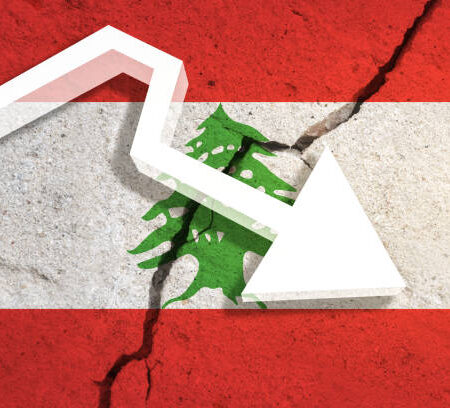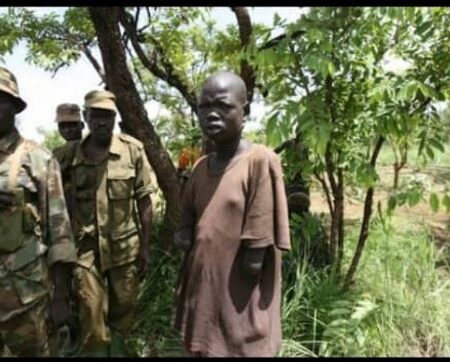On March 11, 2020, the World Health Organization (WHO) announced that COVID-19 coronavirus infection was pandemic. With no definitive treatment yet available, the lockdown was implemented for the greater good of the public. Some people have reported positive developments such as increased family bonding, while on the other hand, domestic abuse and intimate partner violence started to show increasing rates.
In China, according to an anti-domestic violence organization, domestic abuse reports tripled in February 2020. They increased by 40-50% in Brazil, 20% in Spain, and 30% in Cyprus. Arab countries also witnessed an increase in domestic abuse. In Egypt, women reported a 19% increase in violence between family members, with 11% of women having been exposed to violence from their husbands, with verbal abuse being the most common form of violence (Global Violence against women 2020).
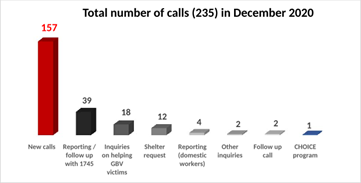
In Lebanon, according to the NGO KAFA (Enough) Violence and Exploitation, a feminist secular non-governmental civil society organization that works to eliminate gender-based violence, the number of calls to their helpline has doubled in one month since the lockdown started and six cases of death of abused women victims have been recorded (see Figure 1). Another NGO, ABAAD, a non-profit, non-politically affiliated, and non-religious civil association that aims to achieve gender equality, witnessed the same phenomenon (see Figure 2).
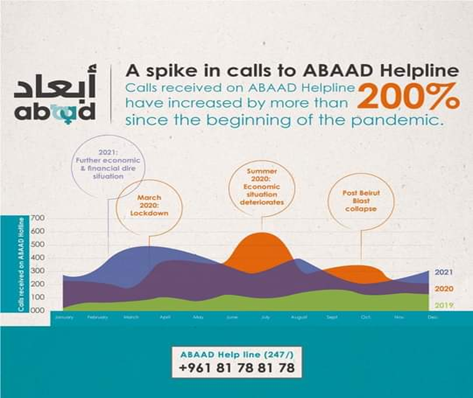
However, these numbers underestimate the full extent of domestic violence and intimate partner violence. Women are afraid to report such violence due to social censure, the inability to report without their abuser knowing, and the fact that they had nowhere else to go during the lockdown. The home that should have protected them from infection by a deadly virus had become unsafe for many women who have been beaten and killed during the quarantine period. A large percentage of women in Lebanon today live in the cycle of violence and persecution practiced against them by the males of the house (fathers, brothers, husbands), In addition to the pandemic, a multiplicity of reasons worsened the situation, such as the psychological pressure on the parties and the lack of options due to the difficult economic situation in Lebanon.
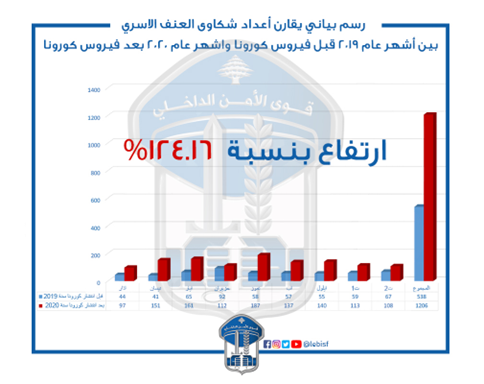
Consequently, if women are able to seek help, the only solution for them is to turn to associations that have set up their services to serve women when they are exposed to violence. The Internal Security Forces, the Democratic Women’s Gathering, KAFA organization, ABAAD association, and others have been combating domestic violence for years and providing assistance to women in facing their most difficult circumstances. These services include protection from abusers, legal advice, psychological support, and even a shelter in case women flee away from home. According to the statistics of the Internal Security Forces, the percentage of communications from women who have been subjected to violence has increased to 100% during the lockdown period (see Figure 3). Internal Security Forces statistics show the increased numbers of domestic violence complaints before and after the first lockdown (2019 – 2020) with an increase of 124.16%.
Domestic violence: a new scar on the wounded body of Lebanon
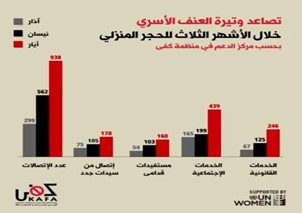
The rate of domestic violence increased by 100 to 300% within a year. The deteriorating economic conditions and the complete closure are reasons behind the growth of the phenomenon (Al-Akhbar, December 8, 2021). Recently, human rights organizations and feminist activists have warned of high rates of domestic violence, especially following the decision of the complete closure imposed by the corona quarantine in Lebanon. Within a year, domestic violence complaints doubled, adding new scars and raising alarms. A security source revealed that the number of domestic violence complaints increased by 96.5% after the start of the lockdown in the period 2020-2021. This source said that the hotline to receive complaints from women recorded 747 complaints during the period from March 2019 to February 2020, while the number of complaints increased to 1462 during the period from March 2020 to February 2021 (see Figure 4).
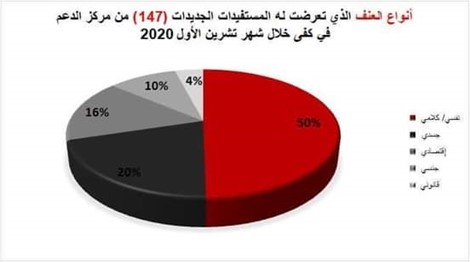
KAFA support center for abused women recorded statistics, with the help of UN Women, that show the number of reported cases of domestic violence increased from 299 in March 2020, to 562 in April, to 938 in May. The support center of KAFA indicated an increase in 178 calls of new violated women in May, while it had recorded 75 calls in March. The center has also offered 439 social help and 246 logical help in May, whereas the number had been smaller during March and April (165 social help during March and 199 during April, also 67 logical help in March then to be 125 in April). According to KAFA, abused women encountered different types of violence from their abusers. In October 2020, the center showed that 50% of the women faced verbal abuse while 20% of them faced physical abuse and 16% faced economical abuse, whereas 10% for sexual abuse, and only 4% of the complaints were the result of legal violations (see Figure 5).
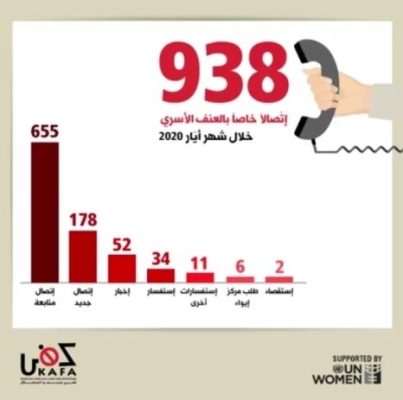
In May 2020, 983 calls related to domestic violence and the calls were distributed as follows: 655 calls for follow up issues, 178 new calls of new abused women, 52 complaints, 34 calls for general information, 11 for different issues, 6 for finding shelter, 2 for investigation (see Figure 6).
In turn, Mrs. Hayat Mirshad, the director of the feminist non-governmental association “Fe-Male,” explained that some women’s organizations have recorded a 200% increase in the number of domestic violence complaints they receive through hotlines. Mirshad said: “According to unofficial statistics, murders in 2020 increased by 59% over the previous year, as last year 171 murders were recorded, compared to 100 in 2019” (Al-Akhbar, December 8, 2021). Then Mirshad pointed out the seriousness and strictness of women’s protection law in Lebanon, but the crisis lies in the implementation mechanism of the law, in addition to the presence of legal loopholes that allow perpetrators to escape punishment under the pretext of honor, and the lack of seriousness in the official treatment of these serious issues
Oral history of domestic violence in Lebanon during a pandemic
The stories of domestic violence in Lebanon are a painful list of dehumanization. Violence in all its types is nothing but a product of reification, which takes place on a daily basis on several levels and leads to the dehumanization of women, making their bodies disposable. The woman becomes a thing and is stripped of her character as a human being. It is easy to throw things off the balcony, for example.
The masculine social structure that depicts marriage as a process of exchange between males, in which a woman moves from her father’s house to her husband’s house, based on a social contract, also contributes to portraying women as things that can be owned. An example of this is the idea of paying dowry, which depicts marriage as a process of purchasing and exchanging a commodity in some families. In addition, the woman is seen as carrying the family’s honor in her body to the extent that it is permissible to kill her if she breaches the contract imposed on her to preserve this honor. This is what contributes to the woman’s guilt when she is abused. Society calls into question her honor and her actions, and wonders what she did to deserve this act of violence, instead of challenging the social structure that incites the perpetrator to act violently. Is it the psychological situation caused by the corona quarantine or the economic distress that has begun to wrap around the necks of the Lebanese women and kill them, or is it a mixture of both?
In Lebanon, women are still subjected to violence in various ways. As the doors of the houses are closed at night, any woman may turn into a victim in the absence of the necessary protection, effective deterrent laws, and most importantly, because of customs and traditions. According to the Human Rights Watch’s report on the subject, women and children continue to face discrimination under sectarian personal status laws, according to which child marriage and marital rape are still legal, and the Lebanese authorities have not fulfilled their obligations to protect women and girls from violence and end discrimination against the foreshadowing of more victims (Human Rights Watch Report, Unequal and Unprotected: Women’s Rights under Lebanese Personal Status Laws, January 19, 2015).
Oppression is shared by women who have different stories. I have had the opportunity to interview Layal (anonymized). She is one of the victims of domestic violence, and she has shared a similar experience with many others in a patriarchal system that always tries to control women and turn them into victims. “I got married to get rid of the violence of my father and brother,” says Layal. This is how her story begins, adding, “I was eighteen years old when I decided to marry my first groom. I was a daughter of a remote village and I did not know anything about life. He carried nothing but hatred and rancor in his heart”. Layal continues, “Problems began to appear in the first days of our marriage. Jealousy and suspicion took over my husband’s mind, who insulted and doubted me until he reached the point of betraying me.” Layal’s marriage lasted for four years, and she asserts that “everything I went through in my family’s house was easy in front of what I was exposed to in this marriage. I have not seen a day of rest since I entered his house. The insults, beatings, and his way of arguing are unbearable, and it has reached the point of marital rape several times.”
On February 9, 2021, in a heinous assault committed by S.S. against his wife Lara (anonymized), he abused her in the morning, right after she was about to leave her home to work at the hospital until she was hit on the head and stabbed with a sharp knife that resulted in a torn in her lungs, severe liver injuries, as well as facial mutilation. I had the opportunity to interview Lara’s lawyer afterward. Regarding the reasons for the resurgence of the phenomenon of domestic violence crime with this force, he believed that the reasons may be due to: “the chaos that we are beginning to witness. The lack of security, and the old laws that still fail to protect battered women,” stressing the need to modernize them and impose deterrent penalties on perpetrators. Regarding the issuance of a decision regarding this crime, he replied: ”until now, due to the corona pandemic and the suspension of court sessions, no ruling or decision has been issued in this regard.”
Another tragic case is the story of Fatima (anonymized), an ambitious girl full of life, who was a victim of domestic violence. Fatima told me her story with teary eyes and a trembling voice: “We were a nice couple at the beginning of our marriage and things were fine, but later on his jealousy and permanent doubt appeared.” She took a deep breath and continued: “with the birth of our first child, our rosy life began to dissipate and my dreams collapsed. I became the most miserable woman. His harsh words left many scars inside my soul, he abused me verbally in every speech and in every situation. (…) He prevented me from working and I was forced to quit my job to become a prisoner in the house. Once he came home and was very angry, and as soon as I asked what was the matter he hit me with his fist and with all his strength on my head and I passed out.”
During our interview, Fatima was upset as she explained her pain. She fell silent for a while, then she said: “men strengthen their muscles against women as if she were a weak creature, but I feel pity for them because they do not carry mercy and they don’t know its meaning, As the days passed, my child became another victim of violence in our house and I was pregnant again but he used to beat me constantly, and whenever I tried to escape he became more and more brutal and cruel.” She shed the tears that she had been trying to hide since the beginning of our conversation. Fatima continued the conversation to say: “my child was born deformed because of the violence I received during pregnancy, I tried to escape with my babies again but I failed. I didn’t feel that I am a woman for a while, but rather a slave who was deprived of rights and worth suffering. My suffering didn’t stop there, during the quarantine of the COVID 19 pandemic the disaster doubled; he no longer left the house, and I became captive of his desires on the one hand and his doubts and verbal abuse on the other. When I refused to give him my body he hit me this time more violently and poured a flaming liquid on me and set fire trying to kill me, but a divine miracle happened when a neighbor notified the security forces and attacked our house as a result of my screaming and saved me from this tyrant but I suffered from burns on my back and shoulders. He was captured. I collected my surgeons and heal my scars with a psychiatrist trying to erase my pain and build myself up again.”
When I ask her about her current social status, Fatima told me that today she works in one of the women’s institutions “The Rural Pioneers” to support cooperative women’s associations to develop and implement business plans in the agri-food sector, and receives all the support and care from her family members and the institution members. She recently got custody of her two children and she is working to provide them with a good future. Fatima ended her speech: “The days will pass and life will go on.”
Despite the impact of the economic crisis on the priorities of women and girls, one out of two women and girls considered that protecting women should be one of the most prominent priorities in the current stage, according to a recent study conducted by the Statistics Lebanon Ltd. commissioned by ABAAD which included 1800 women. Their ages ranged between 18 and 55 from different Lebanese regions, cultural levels, and income groups (ABAAD e-book, Mapping Gender-Based Violence Programs, January 2020). This indicates that women do not feel safe for several reasons, including direct threats to them, what is being done against them, and their fear of tomorrow. Women are still subjected to violence in silence, as 91.7% of those who were subjected to violence within the study sample did not inform anyone, and the majority of those did not seek refuge in the family. Only 11.1% indicated that if they were subjected to violence, they would call ISF (Internal Security Forces) hotline 1745.
There are many reasons for the reluctance of victims of violence to report, including fear of rejection by society (23.3%) or family (13.8%) or the reaction of the perpetrator (14.3%). There are those who do not consider the matter to be a priority because of the current situation in the country (11%), and others who do not trust the possibility of achieving a result (21.1%). Sometimes, those directly concerned do not consider the issue seriously (22.4%). Some do not file complaints due to the lack of knowledge of the parties that can help (12,4%), as only 17.7% have heard about the hotline of the Internal Security Forces, and about the Lebanese law’s punishment of perpetrators of domestic violence. 43.6 % considered that it is not punished, compared to 4.6% who answered that they don’t know, and 51.9% said that they did not consider that human rights organizations had safe shelters and helplines to help victims of emergency violence.
The impacts of domestic violence on society
The growing phenomenon of domestic violence has a painful impact on all social, psychological, professional, and scientific levels for women in society, which turns them into disabled humans who lose their energy when submitted to a cycle of violence, even in relationships. People exposed to domestic violence experience physical, mental, or spiritual turmoil that can last and worsen if they are not addressed. The overall impact of domestic violence also depends on the individual’s natural reactions to stress and how they cope with stressful situations. Other factors can include the age at which the trauma occurred, previous exposure to unrelated traumatic incidents, and the extent of therapy or timing of intervention. Recovery from exposure to domestic violence is possible, and although it requires addressing painful realities, it also entails the discovery of new inner strengths, a process that needs time and space to feel safe again. There is nothing stronger than a broken woman, who has rebuilt herself.
Recommendations
![]() Thanks to women’s organizations and activists’ persistent lobbying and efforts, a law criminalizing domestic violence and promoting the protection of women and family members from it, was finally issued in 2014. Prior to the enactment of this law, domestic violence was not penalized. The law originally targeted women in Lebanon, who were the main victims of domestic violence crimes. However, confessional and political leaders expanded the mandate of the law to include men and children in the family.
Thanks to women’s organizations and activists’ persistent lobbying and efforts, a law criminalizing domestic violence and promoting the protection of women and family members from it, was finally issued in 2014. Prior to the enactment of this law, domestic violence was not penalized. The law originally targeted women in Lebanon, who were the main victims of domestic violence crimes. However, confessional and political leaders expanded the mandate of the law to include men and children in the family.
On 7 May 2014, Law No. 293 was indeed promulgated and aimed at “protecting women and other family members from domestic violence, defining the crime of domestic violence and imposing severe punishment for the protection of the victims.” This is in line with Lebanon’s international obligations and provisions of the Lebanese Constitution in the field of protection of rights and freedoms.
In practice, however, the enactment of laws remains an incomplete step if not properly implemented. Here comes the role of the Security Forces in law enforcement, especially since the law protecting women and other family members from domestic violence is recent and constitutes basic legislation within the legal system in Lebanon because it is in line with the directions and commitment of the Lebanese State, the Universal Declaration of Human Rights and the members of the international human rights community.
What are the most important rules of conduct and behavior of the Lebanese Internal Security Forces (ISF) members towards the abused victim? ISF members must abide by the service memorandum No.164/4204 dated 20/5/2013 when receiving or interrogating violent victims and assessing their psychological and social status, especially if the crime of violence involving the victim is real. The impact of the shock that the victim may be under directly influences her, thus it is crucial to guide her through the procedures that she must follow. Also, the judicial officer’s coercion of the abused victim or the pressure he could exert on her to retract her complaint is a punishable crime under law 293/2014. This law imposed on the judicial officer the punishment stipulated in Article 376 of the penal code. This behavior is classified as abuse of authority and breach of job duties (Questions and Answers Guide about the protection of women and other family members from domestic violence (Law 293). This booklet was issued in cooperation between KAFA and ISF).
Those who are exposed to violence are in dire need of the proper application of this law, as it leads in the short and medium term to the family stability of the society, and this is what most countries and societies aim to achieve. Of course, the Security forces have set up a hotline to receive complaints and report any violence. Furthermore, the KAFA organization has recently issued a mobile application to report domestic violence in complete secrecy in order to protect the victims (https://play.google.com/store/apps/details?id=com.kafaApps.kafa).
Conclusion
Violence against women increased globally during the COVID-19 pandemic. The lockdown exacerbated several factors that affect violence against women. It increased tensions within households, affected gender roles, and increased burdens. Efforts should be made on national and global levels to respond to violence against women in these challenging, unprecedented times, especially when the collective safety of the community is at risk. Together we can break the silence and make our voices heard on domestic violence. To conclude, I wish to borrow the words of former United Nations Secretary-General, Ban Ki-Moon: “There is one universal truth, applicable to all countries, cultures, and communities; violence against women is never acceptable, never excusable, and never tolerable.”
Acknowledgment
An acknowledgment and thank you to the KAFA organization for the help in preparing this review.
Sources
KAFA (enough) Violence & Exploitation
ABAAD – Resource Center for Gender Equality – Bustani street – Beirut
Fe-Male non-governmental organization in Forn El Chebback – Beirut
Civil Society Knowledge Center for Social Science Research and Action
Live Interviews with DV victims
The link address of the blog of this research paper: https://domesticviolence-abusers.blogspot.com/2022/06/domestic-violence-in-lebanon-during.html

